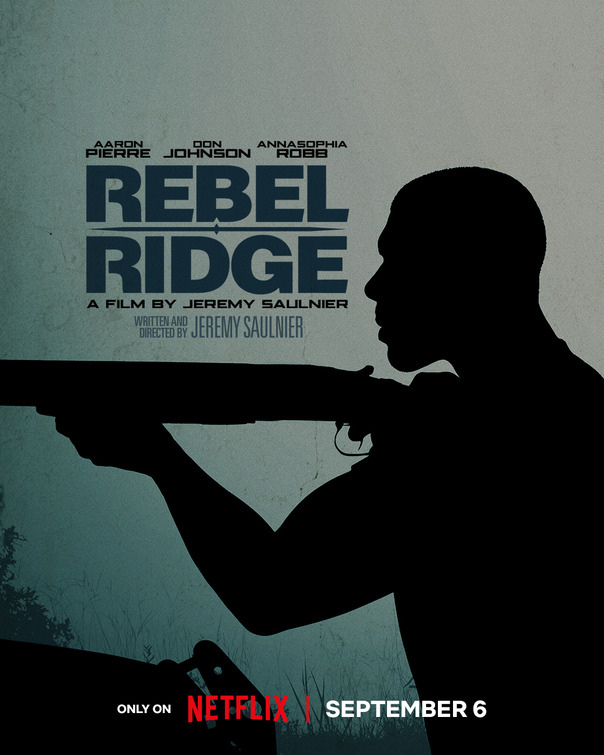
Like the movie’s villains foolishly do with its protagonist, I almost could have underestimated REBEL RIDGE. When last I heard about the movie, it was set to star John Boyega. I’m a fan, and I was disappointed to hear he dropped out. Would have loved to see Boyega in a new film from Jeremy Saulnier, one of the most capable and exciting filmmakers working today. In comes Aaron Pierre. Uh. Who’s that? And costars AnnaSophia Robb. Forgive me, but I’ve only ever seen AnnaSophia Robb in execrable projects (ex: SOUL SURFER). Not her fault, but also not exactly cause for overwhelming enthusiasm. But hey, there’s Don Johnson’s name. I’ve liked him ever since Miami Vice and in the time since, he’s grown into one of the more consistent and entertaining character actors in American movies. (See COLD IN JULY, to name just one.)
And like I said, REBEL RIDGE is the new film from Jeremy Saulnier. MURDER PARTY was such a fun start to a promising filmmaking career, but BLUE RUIN was an astonishing level-up with the kind of lead performance from Saulnier’s friend and collaborator Macon Blair that makes you think, “I’m gonna be seeking out that guy for life.” (You probably saw him last year in OPPENHEIMER, whether or not you recognized him!) And while there’s so much more I could say about 2015’s GREEN ROOM, I’ll put a pin in it and say it was quite simply my favorite movie of that year, or technically, my favorite movie of 2016, when it was widely released. I could also argue it was the best. Because when I talk about Jeremy Saulnier’s films, it’s important to note that I don’t just admire them because I enjoy the stories and resonate with the themes. Saulnier is also one of the most impressive filmmakers on a technical level out there. While 2018’s HOLD THE DARK might not be as immediately rewarding as Saulnier’s previous work, it’s just as well-crafted, with absorbing performances that brought me back to several rewatches and I encourage all viewers to do the same. It’s well worth going back.
I can already predict I’ll be returning to REBEL RIDGE again and again. After a single viewing, I’m already calling it one of the year’s best, which may be a limiting way to talk about a movie that I hope I’ll be revisiting for many years to come. REBEL RIDGE is more than another installment in an impressive filmography (Jeremy Saulnier is five for five, if you ask me), but it’s a movie to meet the moment. It’s a thriller that thrills, an entertainment that entertains, but it’s also profoundly resonant in a post-#BlackLivesMatter America that feels like a horror show teetering on the brink of pure Hell, being held back from falling into the inferno by rare examples of strength and integrity.
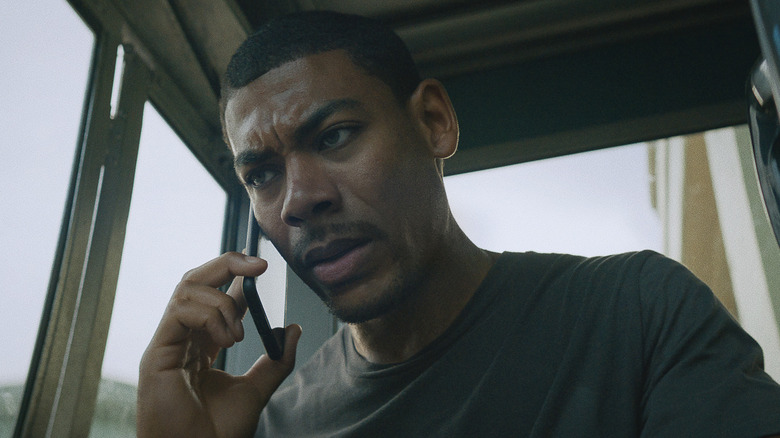
Aaron Pierre plays Terry, a man who is first seen riding his bike with determination through country roads. Two cops (Emory Cohen and the excellent David Denman) ram into his bike and knock Terry into the dirt. I can’t remember off-hand if the movie, which was shot in Louisiana, ever places us directly in any one state, since many of the small-town names, including the one in the title, are fictionalized, but we don’t really need anyone to tell us: It’s the South.
The younger cop, Evan, effectively played by Cohen, is more overtly antagonistic. The older one, Steve, played by Denman, a sturdy oak of an actor who can play amiable (BRIGHTBURN), low-key villainous (TV’s The Office), or both amiable and low-key villainous (TV’s Angel, where I once delivered him scripts as a PA!), is a little harder to read. Why did he stop Terry? According to Steve, Terry ignored requests to pull over. Terry was listening to loud music (Iron Maiden) and didn’t hear any such request. But why did Steve really stop Terry? Why do most cops stop Black men in the South, right? That’s the tension that powers the opening of REBEL RIDGE, which would be enough for most American movies in the year 2024, but REBEL RIDGE is slyer than most American movies. Are Evan and/or Steve racist? Maybe. Probably. If not the one, then the other. This is America.
But as it turns out, Terry is carrying thousands of cash, and that’s really what Steve and Evan are after. Claiming they suspect it’s drug money, these rotten cops confiscate the money, which Terry has been racing to use to pay for his cousin’s bail. His cousin Mike was arrested for a bullshit charge related to weed, but due to Mike’s past, prison is a dangerous place for him to go. So Terry wants to keep him out. Without the money, he can’t. The next several scenes of the movie involve Terry looking desperately for ways to bail Mike out, which may or may not be affecting to the 1% but to the rest of us, who know the true horror of America in 2024 is uncaring bureaucracy, they’re incredibly suspenseful. The one ray of hope is Summer, played by AnnaSophia Robb, who notices Terry’s desperation and attempts to guide him as best she can. She works for the judge (played by an instantly recognizable actor I won’t name here, since the movie plays it as one of its many fun surprises), and she needs that job, so she tries to help Terry, but she can only stick out her own neck so far. AnnaSophia Robb, who as I mentioned up top I had been underestimating, is a revelation in the role. She inhabits a uniquely American figure too many of us can relate to: We want to help, we see the injustice, we want to do the right thing, and we want to do more, but we also have to pay these goddamned bills. We’ve maybe got a kid to worry about. We’ve maybe got a dark history that today we are trying to be better than. All of that is on Summer’s face in these early scenes.
Also grappling with the state of things — or is she? — is Officer Jessica Sims (played beautifully by Zsané Jhé), so far the only other face of color that Terry has seen so far in this town. She tries to handle Terry at the police station, but when he proves too persistent, she calls down Chief Sandy Burnne, which is the Don Johnson role. Note Saulnier’s skill as director in the way he introduces a familiar actor in an intimidating way. The Chief is heard before he’s seen, he lurks ominously off-frame before ever entering it. The Chief lays it out to Terry: Everything Steve and Evan did is perfectly legal — and it is; it’s called civil forfeiture. (Let this British guy explain it.) Terry can either turn around and leave, or things can get worse for him. We’ve all seen FIRST BLOOD. We know Terry isn’t going to turn around and leave. But it may not be Terry for whom things are about to get worse.
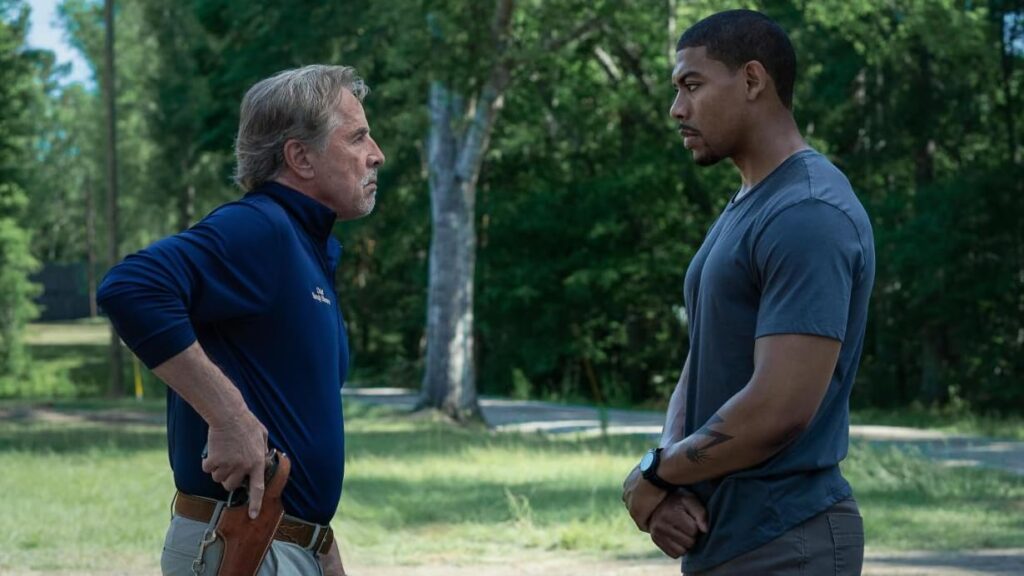
I will stop with the plot recapping there, since the way Jeremy Saulnier as screenwriter and as director (and as Zsané Jhé and Emory Cohen as actors) slowly parcel out exactly who Terry really is and why these dumb hick cops should be a lot more worried than they are, is so damn sweet, so incredibly delicious. And it’s just so effective how the score by Brooke Blair and Will Blair builds from a steady, uneasy drone that heightens the tension before exploding, and the way that the cinematography by David Gallego goes from so artfully capturing the serenity of the nearby forests to the precise, direct way it follows the swift and brutal action that is about to be unleashed.
But as much as any of that, there is the coiled-snake performance by Aaron Pierre. These damn cops didn’t have to keep poking at that snake. He tried keeping his calm. He only hissed at them once (“I fucking told you!” is just so incredibly powerful), but now they’re gonna get bit. Again, as I said up top, I thought I wanted to see John Boyega in this role. Now I cannot imagine any other actor in it. The relative unfamiliarity of Aaron Pierre certainly works in REBEL RIDGE‘s favor: Like the Chief and his police force, we had no idea what Aaron Pierre was capable of until we saw it in action. So many action-hero performances are built on established personas and showcases of charisma from the first minute to the last. This is something different. This is a character and an actor holding back until he can hold back no more; until it is time to act, in all senses of the word.
The less I, being deficient in melanin, comment on the Blackness of it all, the better, but one thing I will say that gives REBEL RIDGE its sociopolitical power is that the movie doesn’t comment on it that much more — not overtly, that is. IN THE HEAT OF THE NIGHT was urgent in 1967, but we are some ways down the road from IN THE HEAT OF THE NIGHT. We don’t need to hear the Chief in REBEL RIDGE use the N-word to know what he thinks of Terry, and beyond that, in 2024 we know that it’s not just about whether or not the Chief is racist. It’s the system that is racist, and that entire system is what Terry is up against. John Rambo could kill hundreds of crooked cops and it still wouldn’t solve the problem: Terry knows that all, too well. Killing isn’t going to be the way that his war is won.
There’s a relatively brief scene in REBEL RIDGE that makes it one of the best films this year, maybe this decade. After cutting a devil’s bargain with the Chief, Terry expects to get a chance to see his cousin Mike before the bus ships off to prison. Of course, you can’t deal with the Devil. The Chief gloats at Terry as he reveals the bus already left. Terry hops back on his bike to catch up to the prison bus. He pedals furiously, he makes it somehow, he slaps on the side of the bus until he gets to the right window. He gets his message out to Mike, but when the cousins go for a pound, the bus speeds up, and Terry misses it. He hits the pedals twice as hard, and this time he makes it.
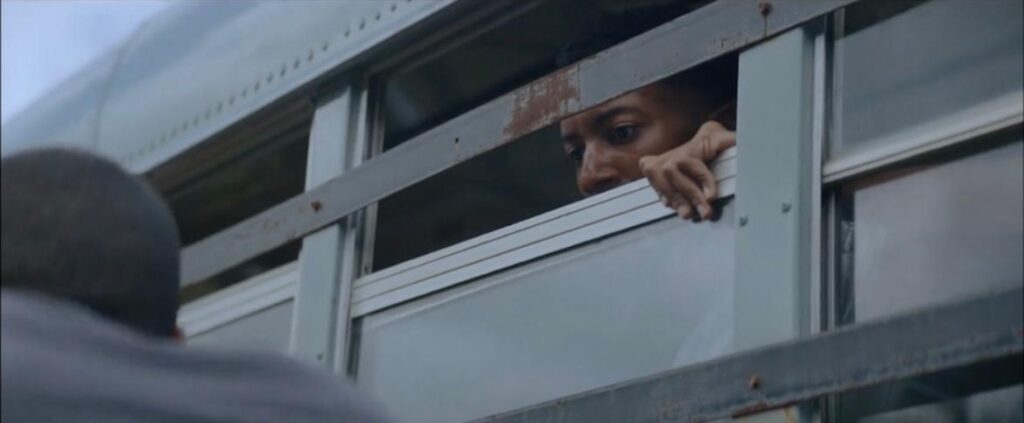
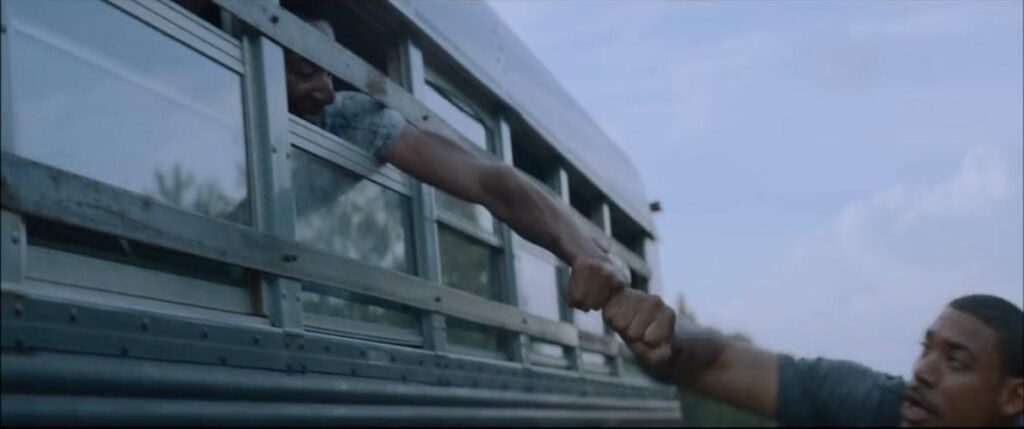
It’s an all-too-brief moment of human connection and love, gone almost immediately, but it means everything. Every damn thing. What happens next is a testament to what makes the movie REBEL RIDGE and the work of Aaron Pierre and Jeremy Saulnier and all of their collaborators on this project so special: Terry speeds up again, one more time, just so he can face the old white prison guard driving the bus. It’s a moment of victory, too brief, too rare, for Terry, for Mike, for every guy on that bus. It’s practically everything COOL HAND LUKE offered to audiences in 1967, but it’s accomplished here in only minutes, and I don’t think Paul Newman himself would mind me saying it, but it means all that much more to see Aaron Pierre triumph in a movie moment like this one in 2024. For me to spell out why would only cheapen the beautifully simple achievement here. I don’t have to tell you why this matters. You’re a human being in the year 2024. You’ll know why the second you see it. You already know why. This here is the unique power of movies as an art form: To show what we know to be true, in a moment heavy on the visual that can hit harder than years’ worth of movingly-worded editorials. If you can show, you don’t need to tell.
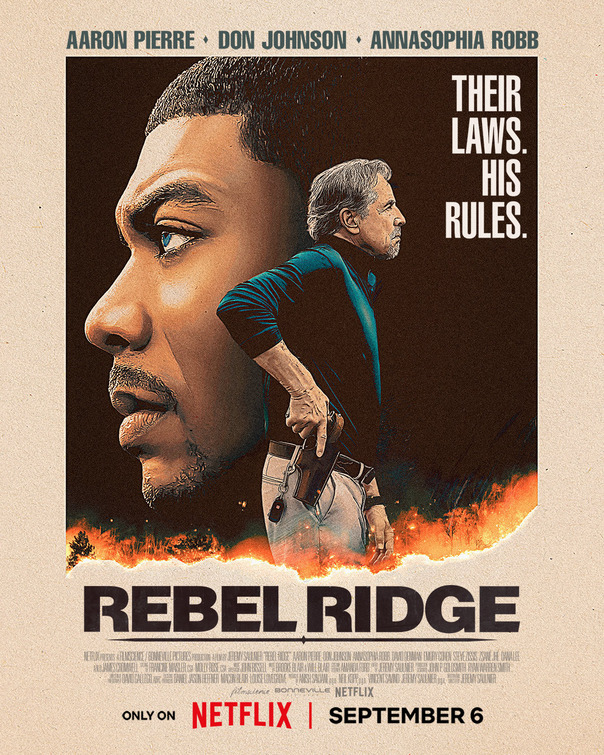
Bonus paragraph! With relatively mild spoilers!
Even beyond its affecting social commentary, REBEL RIDGE represents a quiet revolution for action films. It’s not so far into REBEL RIDGE that we the audience, along with Don Johnson’s Chief, learn that our hero Terry is an expert at non-lethal hand-to-hand combat. We are told this directly in dialogue. We see it in action, not long after we’re first told. But it isn’t until after the movie ends, or it wasn’t for me, anyway, that it really sinks in: I just watched an American action movie that wasn’t filled from start to finish with gun murders. There is a major death in the film that happens off-screen, and not even at the hands of our main villains and certainly not our hero. While I was watching REBEL RIDGE and thrilling to its immaculately crafted, choreographed, and performed fight scenes, it still didn’t really strike me that Terry was taking on an entire police force without killing any of them. It’s like the “Trust me” sequence in TERMINATOR 2, except the entire movie long. It didn’t sink in until after I finished watching REBEL RIDGE: I’ve seen Superman kill more people than Terry Richmond did. And America, trust me: The movie still worked like crazy. If REBEL RIDGE can be called a “revenge” movie, then goddamn, was it way more satisfying this way. When the movie ends, the bad guys aren’t dead: Those fuckers are going to jail. What a happy thought, in this country, in this moment in history. What a nice revenge fantasy for this movie to provide. I don’t want anyone else to die. I just want to see the bad guys — the bad guys, not the good guys — go to jail for once.

- [THE BIG QUESTION] WHAT’S YOUR FAVORITE FEMALE ENSEMBLE IN MOVIES? - July 22, 2016
- [IN THEATERS NOW] THE BOY (2016) - January 24, 2016
- Cult Movie Mania Releases Lucio Fulci Limited Edition VHS Sets - January 5, 2016
Tags: Aaron Pierre, America, AnnaSophia Robb, Brooke Blair, C.J. LeBlanc, Dana Lee, David Denman, David Gallego, Don Johnson, Emory Cohen, James Cromwell, Jeremy Saulnier, Macon Blair, Netflix, Steve Zissis, The South, The USA, Will Blair, Zsané Jhé

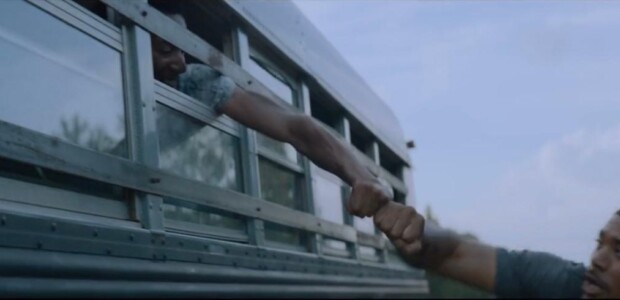




No Comments